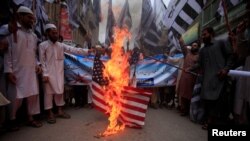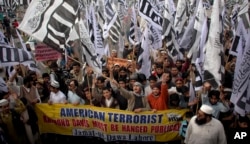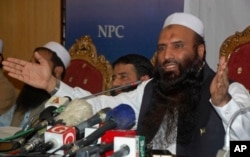A Pakistani group designated by the United States as a terrorist organization has announced it is forming a political party to make Pakistan "a real Islamic and welfare state."
The group Jamaat-ud-Dawa has been listed as a sponsor of terrorism by the U.S. State Department for more than a decade, and its leader and founder, Hafiz Muhammad Saeed, has been under house arrest in Pakistan for the past six months. The U.S. government also has offered a $10 million reward for information leading to his conviction on criminal charges.
Jamaat-ud-Dawa contends it is a humanitarian organization without links to terrorists, but it is widely considered a "front group" for Lashkar-e-Taiba, which has been banned for terrorist activity since 2001. Lashkar-e-Taiba also was founded by Saeed, who is the alleged mastermind of the devastating attacks on Mumbai in 2008 — a dozen coordinated bomb and gun attacks over a four-day period that killed 166 people, including six American citizens, and wounded hundreds of others in the Indian city.
From 'terrorist' to 'moderate'
Despite that terrorist pedigree, Jamaat-ud-Dawa, or JuD, said it aims to enter mainstream politics. Notwithstanding its formal listing as "terrorist" by the United States, the United Nations and Pakistan itself, JuD claims it will be a moderate political force in Pakistan. It is reinventing itself as a new party, the Milli Muslim League, and will be led by Saifullah Khalid, at least until it wins Hafiz Saeed's release from house arrest.
Analysts and experts on South Asian affairs are highly skeptical about the group's intentions and promises, and they wonder whether JuD or its associates in Lashkar-e-Taiba will really cut ties to militant groups. Some suggest the new Milli Muslim League could be a camouflage to mask future nefarious activities.
"It is highly unlikely that Hafiz Saeed will sever the ties [with militant groups] that have helped sustain his popularity in recent years," Michael Kugelman, a South Asia analyst at the Woodrow Wilson Center in Washington, told VOA. "He likely wants to gain legitimacy for his views and ideas by being seen as a political figure, working from within the system, and not merely as a militant leader dabbling in charitable work."
Known by many names
Lashkar-e-Taiba, or LeT, calls itself the Army of the Pure and Righteous and is one of the largest anti-India militant groups in Pakistan, according to American experts on the subject. A U.S. State Department report five years ago listed about 30 aliases for the group and chronicled its terrorist history.
Predominantly based in Punjab, LeT has conducted operations against Indian troops and civilian targets in Kashmir, carried out high-profile attacks inside India, and has been linked to attacks against Western coalition forces in Afghanistan. U.S. officials report that LeT's terrorist acts date back to at least 1993. The group was founded in the 1980s by members of another Islamic extremist organization, at a time when many militant groups fought against the former Soviet Union's military incursion in Afghanistan.
LeT has repeatedly changed its name and continued operating through front organizations, most which also have been placed on the U.S. list of terrorist groups. Jamaat-ud-Dawa joined the list in 2006.
"LeT renamed itself JuD in order to evade sanctions," State Department officials said.
'A direct threat to U.S. interests'
A U.S. Treasury report on terrorist financing last year said LeT and other militant groups in Pakistan "continue to pose a direct threat to the U.S. interests and allies in the region [and] fund their activities through proceeds from illegal businesses and charitable organizations."
Hafiz Saeed first came under house arrest in 2009 after a U.N. committee put him on a list of people accused of supporting al-Qaida. A Pakistani court subsequently released him for a lack of sufficient evidence, but he was confined to his home once again this year.
Saifullah Khalid, who describes himself as president of the new Milli Muslim League, says the erstwhile political party is demanding Saeed's immediate freedom.
"Once he is released," Khalid said this week, "we will seek his guidance and ask what role he wants" in the future.
Hassan Askari, a Pakistan-based security analyst, told VOA he believes Saeed's supporters must do more than change their group's name. Instead they must change their ideology, he said, although he doubts that will happen.
Will their ideology change?
"If they enter mainstream politics, they will have to change their political style," Askari said. "It remains to be seen as to what extent, if any, they will transform and change their attitude, ideas and ideology."
Saeed Nazir, a retired brigadier who works for Islamabad-based Institute of Policy Studies, sees some cause for optimism in these recent developments.
"If they are now abandoning militancy, establishing a political party, entering mainstream politics, presenting a soft image, and becoming accountable, that is positive," Nazir told VOA.
Recasting a pro-terrorist humanitarian organization as a moderate political group could help ease some pressure on Pakistan's government, Nazir added, since the United States has been pressing Islamabad to do more to crack down on militant groups operating from its soil.
Some Pakistani politicians reject Nazir's analysis and charge that militant and banned organizations should not have a political role in Pakistan.
Former lawmaker has deep misgivings
"It is very concerning that Hafiz Saeed, a designated global terrorist, and his banned terror outfit have been allowed to launch a political party," said Bushra Gohar, a former Pakistani lawmaker. "This is a grave violation of the National Action Plan and the country's commitment to peace. It clearly shows that the state and government of Pakistan are continuing with the self-destructive policy of 'good and bad terrorists'" — a reference to the government's flexible policies concerning the Taliban.
Gohar said she sees a terror group's mutation into a political party as a risk for all Pakistani political groups.
The Milli Muslim League "will use a political platform as a cover for its terror activities and networks," she said. "If the Election Commission of Pakistan allows a terrorist group to register for and contest elections, it will have serious negative repercussions for the political and democratic process in the country."
Pakistani opposition political parties expressed outrage last December after Masroor Nawaz Jhangvi, son of the slain founder of the Sunni militant group Lashkar-e-Jhangvi (also on the U.S. and Pakistani terrorist lists) and a hard-line cleric with links to the Taliban and al-Qaida, won a legislative seat in Punjab, the country's most populous province.
"The bottom line," Kugelman of Washington's Wilson Center told VOA, "is that in a country like Pakistan, where some militant groups can operate with near impunity, it's always possible for a terrorist mastermind to establish a political party."







